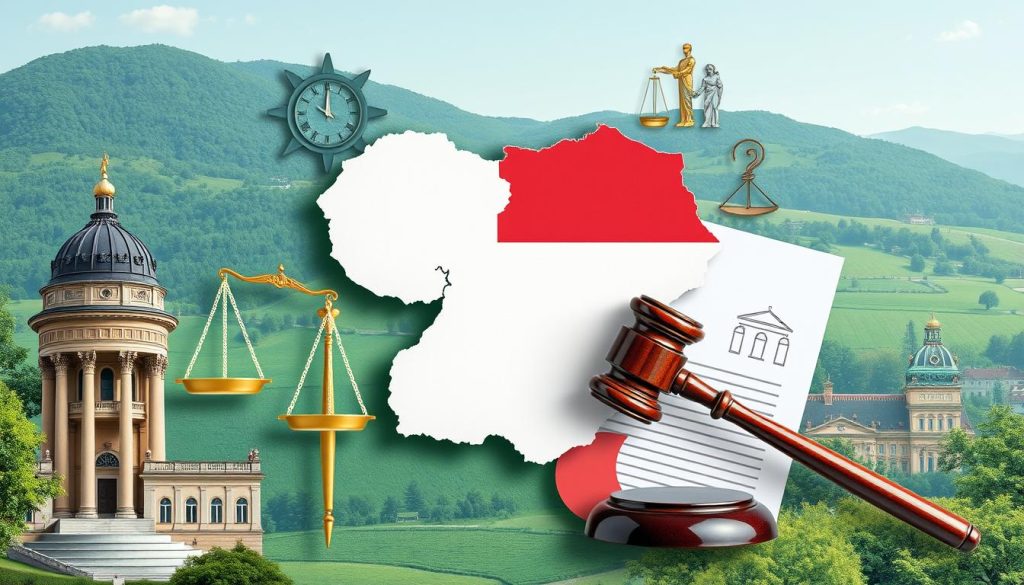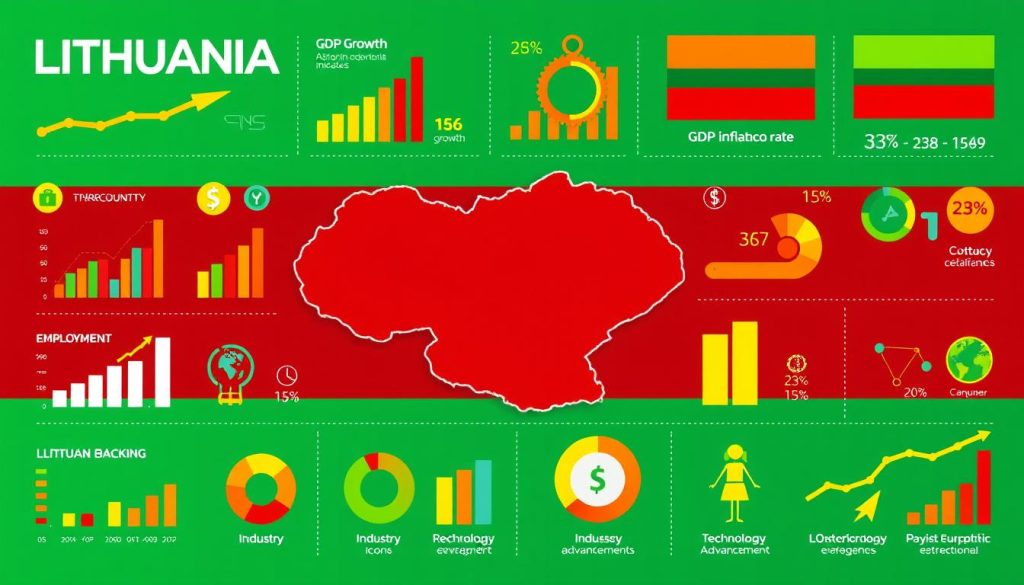Welcome to our Lithuania Investment Guide, made for UK entrepreneurs. It’s packed with information on Lithuanian business opportunities. You’ll learn about the local business scene, legal rules, and tips for starting a business here.
Exploring Lithuania could be a smart move for your business. It could be a great place to expand in Europe.
Understanding the Lithuanian Business Environment

The Lithuanian Economy is stable and growing, attracting businesses worldwide. Being part of the European Union opens up trade and market access. This supports many industries, creating a lively business scene for both locals and international companies.
In Lithuania, building strong relationships and trust is key in business. Networking and personal connections are crucial for success. Companies focus on long-term partnerships. Knowing local customs and traditions is important for good business etiquette and interactions.
Understanding what Lithuanian consumers like is vital for businesses. They value quality and good value. Knowing these preferences helps tailor products and services to meet their needs.
The Advantages of Setting Up in Lithuania

Starting a business in Lithuania has many benefits. It’s a great way to get into the European market. The country also has a skilled workforce, perfect for companies looking for talent.
Strategic Location in Europe
Lithuania is in a great spot for business. It’s close to Western Europe and the Baltic markets. This makes it easy to trade and distribute goods.
Businesses can also use the EU’s trade agreements. This gives them a competitive edge. Plus, there are good transport links like roads, railways, and ports.
Access to Talented Workforce
Lithuania has a well-educated workforce. Many people speak English, making it easier for international companies. The benefits include:
- Strong focus on STEM subjects like science and technology.
- Many tech-savvy graduates from local universities.
- Training programs to keep workers up-to-date with new skills.
Legal Considerations for Businesses

Starting a business in Lithuania means knowing the legal rules well. The laws aim to ensure fair competition and protect businesses. The Commercial Code is the main law for all business activities in Lithuania. Regulatory bodies make sure these laws are followed, keeping the business world fair.
Understanding Lithuanian Business Law
Lithuanian Business Law covers many important areas. These include protecting consumers, handling intellectual property, and how to register a company. Business owners need to know the legal steps for their business type. This knowledge helps avoid legal problems and keeps operations running smoothly.
Types of Business Structures Available
Choosing the right business structure is key in Lithuania. Here are some common ones:
- Limited Liability Companies (LLCs) – known for their flexibility and protection.
- Joint-Stock Companies – best for big businesses needing lots of money.
- Sole Proprietorships – great for solo entrepreneurs wanting to work alone.
- Partnerships – good for groups of people sharing work and profits.
Each type has its own legal rules, like how to register and run the business. Knowing these details is vital for planning and keeping a business going.
Doing Business in Lithuania: Key Economic Indicators

Understanding key Lithuanian economic indicators is crucial for investing in Lithuania. These indicators give a detailed look at the country’s economy and its growth potential. The GDP growth rate is especially important, showing the country’s economic health and stability.
The Bank of Lithuania and Eurostat offer detailed data on the economy. Recent reports show a steady GDP growth rate. This indicates a strong and growing economy. The growth comes from various sectors like technology, manufacturing, and services, drawing in foreign investments.
Monitoring inflation rates and employment levels is also important. A stable inflation rate helps with business planning and efficiency. Low unemployment means a skilled workforce is available. These factors make Lithuania a great place for investment.
Foreign direct investment trends also show investor confidence. The positive outlook from these indicators makes Lithuania an attractive spot for business. It offers many chances for growth and innovation.
Navigating the Tax System in Lithuania

The Lithuanian Tax System aims to help businesses thrive. It offers competitive corporate tax rates and incentives for foreign investors. Knowing these details is key for success in the country.
Corporate Tax Rates
Corporate Tax in Lithuania is 15%, which is lower than many EU countries. This rate helps businesses grow and makes financial planning easier. Certain sectors might even get lower tax rates, showing the government’s support for the economy.
Incentives for Foreign Investors
There are many incentives for international companies in Lithuania. These include:
- Tax holidays for new businesses in key sectors.
- Grants for investments in tech and green energy.
- Breaks from some taxes based on investment and job creation.
Using these incentives can make projects more financially attractive. The State Tax Inspectorate provides the necessary information. It’s crucial to follow the rules and plan well to get the most out of these benefits.
Market Entry Strategies

Companies looking to enter the Lithuanian market have several strategies. Direct Investment and Joint Ventures in Lithuania are two main options. Each has its own benefits and challenges, so it’s important to choose wisely.
Direct Investment vs. Joint Ventures
Direct Investment means setting up operations in Lithuania. This gives a company full control but requires a big investment. It’s good for those wanting full control and a local presence. But, it comes with high costs and risks.
Joint Ventures, on the other hand, involve working with a local partner. This way, companies can share risks and gain local knowledge. It’s easier to get into the market but can lead to issues with decision-making and profit-sharing.
Exporting Goods and Services
Exporting goods and services to Lithuania is another strategy. It lets companies use what they already have without big investments. This way, they can test the market and see what works without too much risk. Building strong relationships with local distributors and partners can help a lot.
Licensing and Permits Required in Lithuania

Starting a business in Lithuania means you need to know about Business Licenses. Each industry has its own rules. You must get the right permits to start your business.
In Lithuania, different government agencies handle license and permit issues. The State Enterprise Centre helps with sector-specific rules. Always check with local authorities for your business type.
- Find out the specific licenses you need, like for hospitality or manufacturing.
- Fill out application forms correctly to avoid delays.
- Get help from local experts or consultants for better advice.
- Be ready to show documents like business plans and financial forecasts.
- Keep track of permit renewal dates to stay compliant and avoid fines.
Meeting all regulatory needs helps launch and grow your business in Lithuania.
Establishing Relationships with Local Partners

Building strong business relationships is key to success in Lithuania. Connecting with local partners can lead to new opportunities and insights. Knowing the local networking scene and cultural norms helps in forming successful partnerships.
Networking Opportunities
In Lithuania, there are many ways to network, like trade fairs, industry conferences, and networking events. These events are great for meeting potential partners and learning from industry experts. Some notable events include:
- International Trade Fairs
- Business Networking Breakfasts
- Industry Conferences
By taking part in these activities, businesses can build trust and create lasting relationships. These relationships are essential for doing well in the Lithuanian market.
Cultural Considerations in Business
It’s important to understand Lithuanian business culture to form strong partnerships. Building personal connections is crucial. Here are some key aspects of Lithuanian business culture to remember:
- Politeness and Formality: Initial meetings are formal. It’s best to use titles and surnames until you’re close.
- Punctuality: Time is very important. Showing up on time for meetings shows respect.
- Direct Communication: Lithuanians value honesty and clear communication in talks.
By embracing these cultural aspects, businesses can have smoother interactions. This helps in building reputable relationships, which is good for foreign companies in Lithuania.
Understanding the Lithuanian Consumer Market

The Lithuanian Consumer Market is changing fast. It shows how people’s tastes and habits are evolving. This change is due to the economy, new tech, and how people live their lives. Knowing these trends helps businesses find good opportunities in Lithuania.
Consumer Behaviour Trends
Online shopping is becoming more popular in Lithuania. This shows how digital life affects how people shop. The main trends in Lithuania include:
- More money spent on tech and gadgets, with a focus on quality and new ideas.
- More interest in green products, as people care more about the planet.
- Choosing local goods, to help local businesses and build community ties.
Key Sectors for Investment
Several sectors in Lithuania are growing fast. They offer great chances for investment. The top areas to consider are:
- Information Technology: The tech-loving people need new IT solutions.
- Healthcare: With more older people and health awareness, there’s a need for better healthcare.
- Renewable Energy: Lithuania wants to be green, so investing in clean energy is key.
Importance of Digital Infrastructure

In Lithuania, Digital Infrastructure is key for both new and established businesses. The country has made big steps in making online services available to all. This creates a space where technology fits well into business life.
Internet Penetration and E-commerce Growth
Lithuania has a high internet penetration rate, which boosts E-commerce growth. The Digital Economy and Society Index (DESI) shows about 80% of homes have internet. This high connectivity helps businesses grow online and keeps customers engaged.
Utilising Technology for Business Growth
Using advanced technology can really boost business performance. It helps manage customer relationships better, makes operations smoother, and expands market reach. Even small businesses can now compete globally with e-commerce, opening up new income sources.
Local Labour Laws and Regulations

The Labour Laws in Lithuania focus on fair employment and clear rules. These laws set standards for how workers are treated and what employers must do. Following these rules is key to good relationships with employees.
Important parts of Labour Laws in Lithuania include:
- Employee Rights: Workers have rights like fair pay, the right to join unions, and protection from unfair treatment.
- Minimum Wage: The government sets a minimum wage to make sure everyone gets a fair income.
- Employment Contracts: Employers must give written contracts that show job details, pay, and other work conditions.
Employers should also focus on Hiring Practices that are open and fair. This meets legal standards and helps build a positive work culture. It also builds trust among staff.
Financing Your Business in Lithuania

In Lithuania, there are many ways to fund your business. Local businesses often go to Lithuanian banks for loans and credit. These are key for Business Financing in Lithuania.
But there’s more than just banks. Venture capital firms offer money and advice to new businesses. This mix of funding and guidance is crucial for startups.
EU funding programmes also help. They support innovative projects that boost Lithuania’s economy. Entrepreneurs can find grants and subsidies to help start and grow their businesses.
Knowing about funding options is important. Business plans need to be well-prepared. Lithuanian banks and investors look for clear, promising proposals.
Exploring funding in Lithuania can lead to great partnerships and success. Entrepreneurs should look for and apply to the right funding opportunities.
Overcoming Challenges in the Lithuanian Market
Entering the Lithuanian market comes with its own set of hurdles. Bureaucratic delays and cultural misunderstandings can slow down growth. Language barriers and regulatory issues can make operations tough and communication with locals hard.
It’s key to understand these challenges to develop strategies for success. This way, businesses can integrate well into the market.
Identifying Common Pitfalls
Not knowing local business practices can lead to big mistakes. Firms also face challenges with changing regulations. These issues can make it hard for a company to get established.
Being aware and prepared is crucial to avoid these risks. It helps in managing business challenges effectively.
Strategies for Risk Management
Strong risk management strategies are vital for success in Lithuania. Building good relationships with local partners can offer valuable advice. Investing in market research helps spot potential problems early.
Working with experts who know the local laws and business scene is also important. This way, businesses can tackle the market’s complexities head-on. A proactive approach helps manage risks and ensures long-term success.

